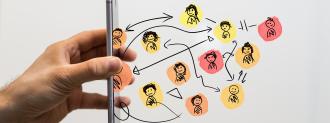A new University of Oxford study has found that contact-tracing apps could play a major role in bringing the coronavirus pandemic to an end — without forcing people to give up their privacy.
Though specifics vary, the basic idea behind contact-tracing apps for the coronavirus is to monitor where smartphone owners go and then alert them if they cross paths with someone diagnosed with COVID-19.
China was the first nation to report a coronavirus infection, and it was also the first to release an app to trace the virus’ spread.
Since the release of China’s app in February, several more nations have released their own coronavirus contact-tracing apps — and according to the Oxford team’s research, other countries would be wise to follow suit.
Benefits of Contact-Tracing Apps
After crunching the numbers, the Oxford team concluded that, mathematically, contact tracing could help end the coronavirus epidemic by significantly slowing transmission rates.
For the approach to be effective, though, a nation would need to implement a contact-tracing system that allows it to quickly and efficiently track the movements of 60 percent of its population — and that’s where a contact-tracing app could be a lifesaver.
“A contact-tracing app can help ease us out of confinement.”
Christophe Fraser
“Classic contact tracing is slow as it mainly relies on manual labour, and is extremely limited in scale by the availability of personnel,” the researchers wrote online. “Introducing a mobile app will allow for contact tracing to be done instantaneously, efficiently, and at unlimited scale.”
Implementation of such an app could eliminate the need for widespread lockdowns, which, as the researchers point out, can negatively impact the economy and people’s psyches.
“A contact-tracing app can…help ease us out of confinement,” researcher Christophe Fraser said in a news release. “If we know we’ve not been in contact with anyone infected we can leave home safely, whilst still protecting our loved ones and avoiding a broader resurgence of coronavirus in our community.”
Protecting User Privacy
So, contact-tracing apps might be effective for addressing the coronavirus pandemic, but are they ethical?
After all, they require traversing not one but three ethical minefields: data privacy, government surveillance, and the sharing of personal health information.
According to the Oxford team, contact-tracing apps can be done ethically — if designed properly.
The group emphasized that it would need to be opt-in — no forcing people to download and use it — and the public must have a chance to provide input into the app at every stage of its implementation.
Contact-tracing apps must also put a premium on security and privacy, something the researchers think they’ve achieved with the design of a prototype system.
“The mobile app concept we’ve mathematically modeled is simple and doesn’t need to track your location; it uses a low-energy version of Bluetooth to log a memory of all the app users with whom you have come into close proximity over the last few days,” researcher David Bonsall said in the news release.
“If you then become infected, these people are alerted instantly and anonymously, and advised to go home and self-isolate,” he continued.
Bluetooth-Based App Incoming
The idea of using Bluetooth — as opposed to harder-to-anonymize GPS data — for an app that tracks the coronavirus has already caught on with at least one group.
Through the Pan-European Privacy-Preserving Proximity Tracing (PEPP-PT) initiative, more than 130 researchers from eight European nations are currently developing a Bluetooth-powered contact-tracing app.
“We said, ‘We need to do something, but we can’t do it the way that China has done it.’ Because if we did, we would at the same time just throw away freedom,” PEPP-PT co-organizer Hans-Christian Boos told Business Insider.
The group aims to launch its app as soon as April 7 and will offer it up to any countries that want it for free.
That means every country in the world could soon have access to a contact-tracing app for the coronavirus that won’t step on citizens’ rights, but will get them out of lockdown as soon as possible.






